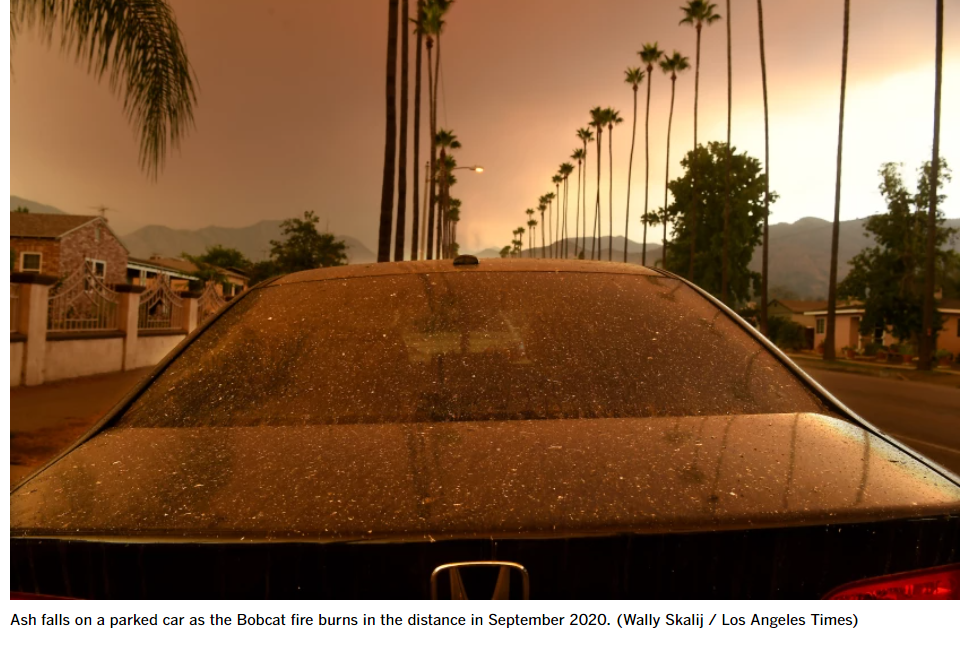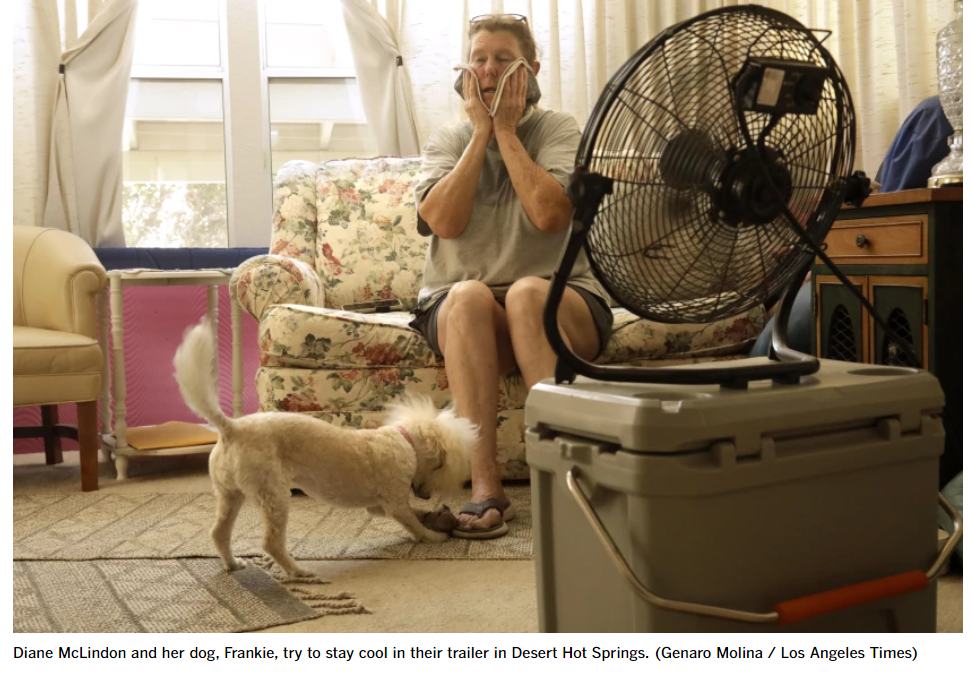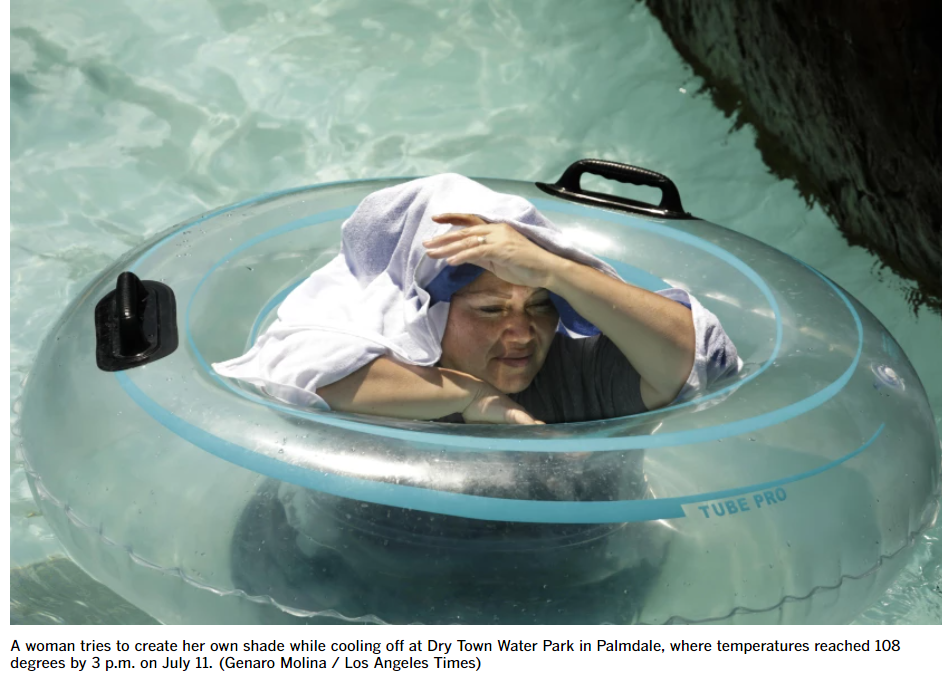If you’re looking for evidence that the climate crisis is taking a toll, look no further than a new survey of Angelenos.
Fifty-one percent of Los Angeles County residents avoided going outside at some point between summer 2020 and summer 2021 because of concerns about breathing wildfire smoke, the University of Southern California survey found. More than one-quarter of Angelenos said they had suffered psychological distress due to a disaster such as a fire, flood or extreme heat during that time.
Heat storms in particular are taking a toll on quality of life. Fifty-four percent of local residents said they had gone to a mall, library, community center or other cool location for the sole purpose of getting out of the heat — a startling number, at least to me.
Rising temperatures don’t affect everyone equally. The survey found that 27% of Black Angelenos work outdoors with no cover, much more than any other racial group. And whereas 62% of white survey respondents said their neighborhoods have enough trees to provide adequate shade for walking on a hot, sunny day, only 51% of Latino, Asian and Black residents said the same.
Overall, more than three-quarters of respondents said climate change is a threat to the well-being of Angelenos.
It’s not hard to see what’s giving people that idea. Los Angeles County recorded a record-high 121-degree temperature during an excruciating heat wave in summer 2020, following a decade in which heat killed an estimated 3,900 Californians, with the death count rising over time, according to an L.A. Times investigation. Southern California officials have issued air quality advisories due to wildfire smoke on 17 days so far this year — and 55 days last year, when the Bobcat fire raged in the San Gabriel Mountains.
Kelly Sanders, an energy and climate expert at USC who was not involved with the survey, told me it’s more than wildfires to blame for filling the air with smoke and keeping people indoors. California is in drought — and lack of rainfall not only primes the landscape for fire but also allows lung-damaging particles to linger in the air longer. High temperatures, too, can exacerbate smog.
All those forces — heat, drought, wildfires, air pollution — are made worse by the burning of fossil fuels.
Sanders pointed to the growing number of Californians who have experienced ash falling out of the sky.
“It’s not just a one-off — it’s happening every year, multiple times a year at this point,” she said. “We always talk about these apocalyptic events in the future, but ash falling out of the sky — it doesn’t get more apocalyptic than that.”

The USC survey offers reasons for hope, too. I was encouraged that 40% of Angelenos say their next car is likely to be electric. (I wasn’t one of the 1,244 people to take the survey, but I would have said the same.) Large majorities of Angelenos also try to limit their electricity and water use, the amount of time they spend driving and how much meat they eat — all good for the climate.
Interestingly, older people were more likely to say their individual actions can make a difference in tackling global warming — a sign that younger generations, such as my own, are fed up with decades of inaction by corporations and government and are sick of being told their lifestyles are to blame. Fifty-seven percent of survey respondents ages 18 to 39 said their actions can make a difference, compared with 75% of respondents in their 40s, 71% in their 50s and 65% age 60 and older.
Younger people “have a different idea about who are the humans that are causing climate change,” said Kyla Thomas, director of the LABarometer survey at the USC Dornsife Center for Economic and Social Research, which conducted the polling.
One other key finding: Just 17% of Angelenos said local government is doing enough to fight climate change.
To be fair, I don’t know of any local government that’s truly doing enough, given the science showing that global emissions need to be cut roughly in half in less than a decade. But it’s not hard to point to places where Los Angeles is falling short. Just to offer one example from my previous reporting, the city still doesn’t have a plan for reducing planet-warming emissions from residential gas heating and gas stoves, despite Mayor Eric Garcetti setting targets for net-zero-carbon buildings way back in April 2019.
Garcetti did join with three City Council members this week to introduce a motion instructing L.A.’s climate emergency office to develop recommendations for slashing emissions from gas appliances in homes, with a focus on affordability. Environmental justice activists have raised concerns that requiring electric heating and cooking could raise energy and housing costs.
The new initiative “will ensure that the people who are most impacted by climate change and housing insecurity are the ones leading the conversation, and that the solutions proposed lead to strong labor, housing, and health protections,” said Martha Dina Argüello, executive director of Physicians for Social Responsibility-Los Angeles, in a written statement.

Shifting from gas cooking to induction stoves will be especially important as wildfire smoke and higher temperatures force people to spend even more time sheltered at home with the windows closed, Sanders said. That’s because cooking with gas can lead to high levels of indoor air pollution. And gas stoves aren’t the only problem — the air outside has a big effect on the air inside.
“We need to focus more on improving our homes and buildings to promote safe indoor air quality, as well as access to adequate air conditioning. People are spending a lot more time at home,” Sanders said. “Communities living closer to pollution sources like highways, wildfires, industrial centers, the ports — they’re really disproportionately impacted by this poor air quality.”
You can check out the detailed survey results here. They’ve really got me thinking about how many politicians still talk about climate change as a problem to be solved for the sake of future generations, as opposed to a disaster that is here now and making the planet progressively less livable for current generations. President Biden, for instance, recently pitched his “Build Back Better” legislation by describing the fight against global warming as an “obligation to our children and to our grandchildren.”
That attitude is admirable but behind the times. We live in a world where large and growing numbers of people are staying indoors to protect their lungs from wildfire smoke, going to the mall to stay cool and feeling anxiety from climate calamity.
Article Credit: latimes
